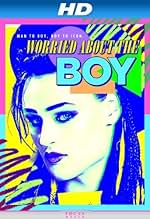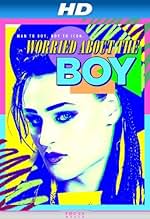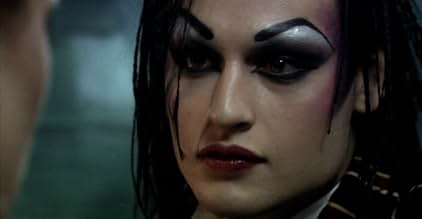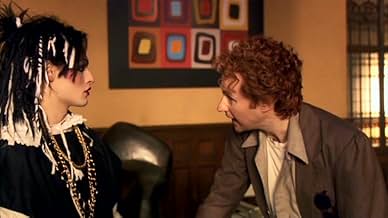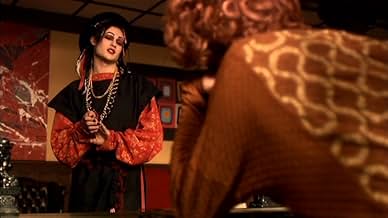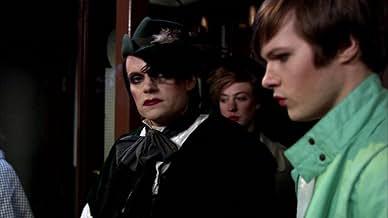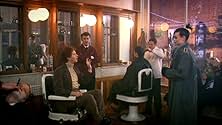VALUTAZIONE IMDb
6,9/10
1593
LA TUA VALUTAZIONE
Aggiungi una trama nella tua linguaThe story of Boy George, the famous androgynous lead singer of the band, Culture Club.The story of Boy George, the famous androgynous lead singer of the band, Culture Club.The story of Boy George, the famous androgynous lead singer of the band, Culture Club.
- Regia
- Sceneggiatura
- Star
- Ha vinto 1 BAFTA Award
- 2 vittorie e 1 candidatura in totale
Recensioni in evidenza
It's a shame there is no Theatre of Hate songs in this 80's strory which is the band that Kirk Brandon was the lead singer. This is an interesting story from Boy George's Autobiography one which Kirk Brandon denied & sued Boy George in Court & lost. I found it entertaining enough & there are lots of 80's tunes in here but no Kirk Brandon songs maybe due to copyright but it would have added some context to the story. Apart from that it was an otherwise piece of 80's nostalga with a story that many may not have previously known about.
I thought that this was well acted & both actors who played the two main characters were very good & convincing playing Boy George & Kirk Brandon (who was Rob Stark in Game of Thrones). Do you really want to hurt me is used in the film & suits it perfectly as you will find out if you warch this gem. There are many other well known 80's musicians and icons who are scattered throughout the film so see how many you can spot.
I thought that this was well acted & both actors who played the two main characters were very good & convincing playing Boy George & Kirk Brandon (who was Rob Stark in Game of Thrones). Do you really want to hurt me is used in the film & suits it perfectly as you will find out if you warch this gem. There are many other well known 80's musicians and icons who are scattered throughout the film so see how many you can spot.
Having only recently read 'Take It Like A Man', Boy George's compelling and brilliantly entertaining autobiography, I was excited by the prospect of this. I've never been a Culture Club or Boy George fan, but I love tales of rock 'n' roll excess and I was happy to find the book did exactly this.
This film, however, proved to be a bit of an anti-climax. Whilst everything appeared to be accurately depicted and the era authentically portrayed, the problem was that it stopped just as things were getting interesting. The book really came into its own once Boy George and Culture Club found fame but film stops dead at this point, with the exception of a few flash-forwards to 1986 when George was engulfed in controversy and smack addiction. I appreciate what went on before is relevant but what was shown in the film should have been condensed down, allowing the majority of it to focus on what happened thereafter. But I guess that ultimately wasn't the point.
I definitely think George's fame, popularity and infamously colourful life warrants a screen adaptation, but merely giving us an insight into what went on beforehand makes me think this was a missed opportunity.
On a slightly more positive note, to hear that the lead was only 17 is astounding and he did a terrific job in what must have been a very challenging role.
This film, however, proved to be a bit of an anti-climax. Whilst everything appeared to be accurately depicted and the era authentically portrayed, the problem was that it stopped just as things were getting interesting. The book really came into its own once Boy George and Culture Club found fame but film stops dead at this point, with the exception of a few flash-forwards to 1986 when George was engulfed in controversy and smack addiction. I appreciate what went on before is relevant but what was shown in the film should have been condensed down, allowing the majority of it to focus on what happened thereafter. But I guess that ultimately wasn't the point.
I definitely think George's fame, popularity and infamously colourful life warrants a screen adaptation, but merely giving us an insight into what went on beforehand makes me think this was a missed opportunity.
On a slightly more positive note, to hear that the lead was only 17 is astounding and he did a terrific job in what must have been a very challenging role.
To the mainstream, Boy George appeared from left-field, a chart-topping male pop-star who dressed like a woman. Yet George was not just a freak show; he emerged from the androgyny of the New Romantic club scene, even if few had attempted such an extreme look before; his band made records of genuine merit; and of course, in a period where homosexuality was still not as widely accepted as it is now, it was not just for its aesthetic qualities that his dress sense attracted attention. Julian Jarold's film, 'Worried About the Boy', gives a good feeling of what it was like for George prior to fame, finding his way through a world in which he always possessed a measure of star quality; although I don't recall George ever looking quite as naturally feminine as actor Douglas Booth. What the film lacks is a certain narrative purpose: George got dressed up, had relationships, formed bands and eventually made it onto 'Top of the Pops'; 'Worried About the Boy' explains how, but the problem with many real-life dramatisations is that they essentially amount to "stuff happens" and I felt something of the same here. There are hints of a bigger story in the relationship of George and Kirk Brandon; but you need to know what happened later to understand these. And the film is also guilty of some obviousness; when George visits Malcolm McLaren, the Sex Pistols appear on the soundtrack, even though the period is wrong. In spite of this, I still enjoyed the film, an interesting view of an unlikely road to fame.
Douglas Booth made an utterly stunning and very watchable Boy George, capturing his sharp witted and ultimately rather romantic character without ever resorting to campness or cliché. I enjoyed this drama for the gorgeous recreation of what must have been a fascinating time in London's cultural history and the fabulous design of the costumes and sets. But even though the dialogue at times sparkled (special mention here for Freddie Fox playing a magnificent Marilyn) it was rather a case of style over substance. The story just felt very thin and although there were some surprisingly touching moments (with Kirk as well as John Moss) there just didn't seem enough story here to sustain an hour and a half. I felt the addict section of the story really limped along and felt underdeveloped and unnecessary in particular. However they did a good job of making the characters engaging and likable and for that reason it was worth the hour and a half spent with them. I just would have liked to have seen a bit more of events, and also a bit more about George's motivations - what made him who he was.
Boy George can certainly be described as an 80's icon. I distinctly remember as a youngster first seeing his band Culture Club perform 'Do You Really Want to Hurt Me' on some kids TV show some time in the early 80's and then seeing him interviewed immediately afterwards and being utterly amazed he was not a she. I seem to recall fellow school-mates being somewhat flabbergasted about this the following day too. These were less enlightened times as far as homosexuality was concerned, so I guess Boy George was even more of a cultural happening taking that into account. Despite his image, part of the reason Culture Club became so massively popular was that George himself was never promoted as threatening sexually, while the band's music was very contemporary new wave pop with little edge. But like most things that connect so fully with mainstream culture, the fame and success only lasted a fairly short while.
This TV biopic is unusual in that it hardly focuses on the Culture Club years at all. Instead, it covers George's pre-fame and post-peak tabloid celebrity years. In doing this, it sort of misses out the most dramatic section of the story and looks at what led George there and how it affected him negatively afterwards. This approach means that you have to accept what the film is not, although it definitely makes the story more small-scale and lower key. The early years are typified by the fashion scene that revolved around the Blitz Club which was populated by the New Romantics; while the later scenes happen in the midst of George being hounded by the press over his reported heroin addiction. The film flashes forward and back to these two periods to tell the story. And in some respects it's quite a limited story in all honesty. The early years were typified, after all, by George not really doing a lot and gaining minor celebrity for merely wearing the right clothes. One of the more notable events happens when he briefly hooks up with Malcolm McLaren – very well played by Mark Gatiss – and is photographed with his then pop pets Bow Wow Wow but little came of this, so it's just a colourful detail.
Mainly the film works as a time capsule movie, where we are transported back to the early 80's. Several characters from the New Romantic scene appear, such as Steve Strange, Marilyn and Kirk Brandon; the latter of which had a sexual affair with the singer. The costuming and soundtrack have been chosen well and despite the low budget, it's convincingly of its time. The main acting duties are covered by newcomer Douglas Booth, who is decidedly more androgynous than the real Boy George. He puts in a pretty good performance, especially when you consider he was only 17 years old at the time. On the whole, this is a film that should appeal to those who like biopics about popular music figures. It might not be the most dramatic story but it is well told for what it is.
This TV biopic is unusual in that it hardly focuses on the Culture Club years at all. Instead, it covers George's pre-fame and post-peak tabloid celebrity years. In doing this, it sort of misses out the most dramatic section of the story and looks at what led George there and how it affected him negatively afterwards. This approach means that you have to accept what the film is not, although it definitely makes the story more small-scale and lower key. The early years are typified by the fashion scene that revolved around the Blitz Club which was populated by the New Romantics; while the later scenes happen in the midst of George being hounded by the press over his reported heroin addiction. The film flashes forward and back to these two periods to tell the story. And in some respects it's quite a limited story in all honesty. The early years were typified, after all, by George not really doing a lot and gaining minor celebrity for merely wearing the right clothes. One of the more notable events happens when he briefly hooks up with Malcolm McLaren – very well played by Mark Gatiss – and is photographed with his then pop pets Bow Wow Wow but little came of this, so it's just a colourful detail.
Mainly the film works as a time capsule movie, where we are transported back to the early 80's. Several characters from the New Romantic scene appear, such as Steve Strange, Marilyn and Kirk Brandon; the latter of which had a sexual affair with the singer. The costuming and soundtrack have been chosen well and despite the low budget, it's convincingly of its time. The main acting duties are covered by newcomer Douglas Booth, who is decidedly more androgynous than the real Boy George. He puts in a pretty good performance, especially when you consider he was only 17 years old at the time. On the whole, this is a film that should appeal to those who like biopics about popular music figures. It might not be the most dramatic story but it is well told for what it is.
Lo sapevi?
- QuizMany clothes that Douglas Booth and Mathew Horne are wearing are original clothes, kindly provided by Boy George and Jon Moss themselves.
- Citazioni
Boy George: I'm not a drug addict, I'm a drag addict.
- ConnessioniFeatured in Breakfast: Episodio datato 14 maggio 2010 (2010)
- Colonne sonoreGo Wild in the Country
Written by Matthew Ashman, David Barbarossa, Dave Calhoun and Malcolm McLaren
Performed by Bow Wow Wow
I più visti
Accedi per valutare e creare un elenco di titoli salvati per ottenere consigli personalizzati
Dettagli
- Data di uscita
- Paese di origine
- Lingua
- Celebre anche come
- Preocupados por el chico
- Luoghi delle riprese
- Manchester, Inghilterra, Regno Unito(Interior, pub)
- Azienda produttrice
- Vedi altri crediti dell’azienda su IMDbPro
- Tempo di esecuzione
- 1h 27min(87 min)
- Colore
Contribuisci a questa pagina
Suggerisci una modifica o aggiungi i contenuti mancanti


